Ukraine elections: Runners and risks
- Published
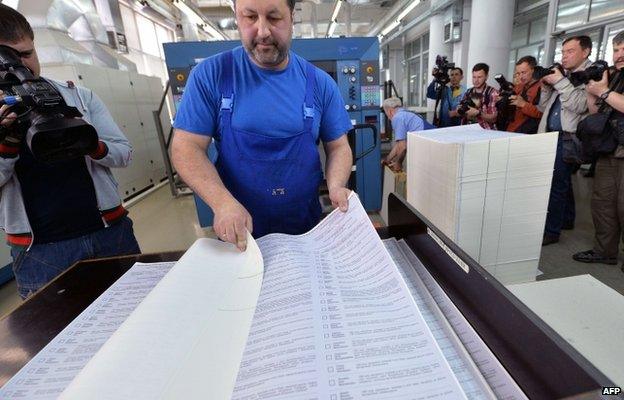
A worker in Kiev examines ballot papers which will be used in the election on May 25
Ukrainian voters are electing a successor to deposed President Viktor Yanukovych.
Continuing violence involving pro-Russian militants in the eastern parts of the country poses a major threat to the campaign. But if held successfully, the election could become a turning point in the long-running crisis.

Is the election going ahead?
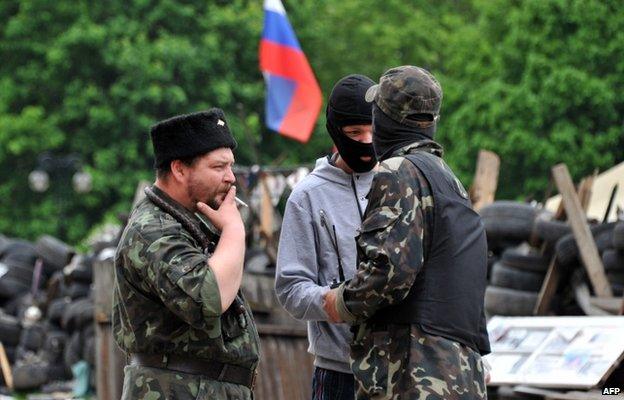
The authorities face a difficult task in areas controlled by pro-Russian separatists
The Ukrainian government is sparing no effort to enable the election to take place. It has admitted, however, that it may not be possible to hold the poll in territories controlled by pro-Russian groups in the east. The latter have vowed to thwart the vote, and there have been reports of election officials being intimidated and electoral commission offices being taken over by pro-Russian activists in eastern Ukraine.
In Crimea, which was annexed by Russia in March, there will be no voting.
There is no minimum turnout requirement. If none of the candidates wins more than 50% of the vote, a run-off between the two top contenders will be held on 15 June.
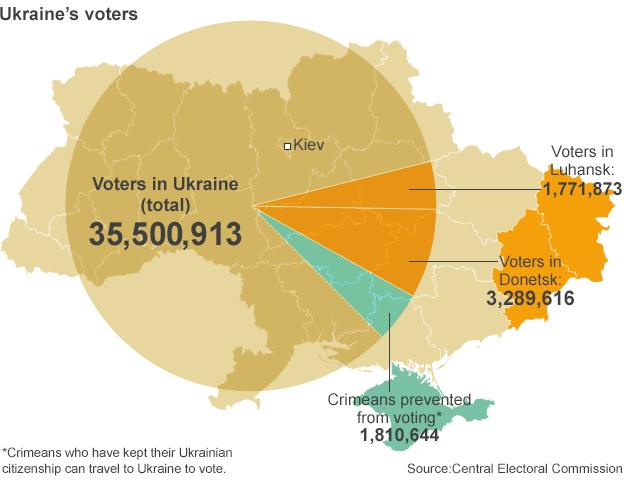
Slightly more than 19% of Ukraine's 35.5 million voters live in the three regions affected by pro-Russian unrest: Crimea, Donetsk and Luhansk. In Crimea (1.8m voters or 5.1%) there is no voting at all following its annexation by Russia. In Donetsk region (3.3m voters or 9.3%), half of the district electoral commissions are either under rebel control or vulnerable to attack during the election, electoral officials say. In Luhansk (1.8m or 5%), it is a similar picture for two thirds of the commissions.
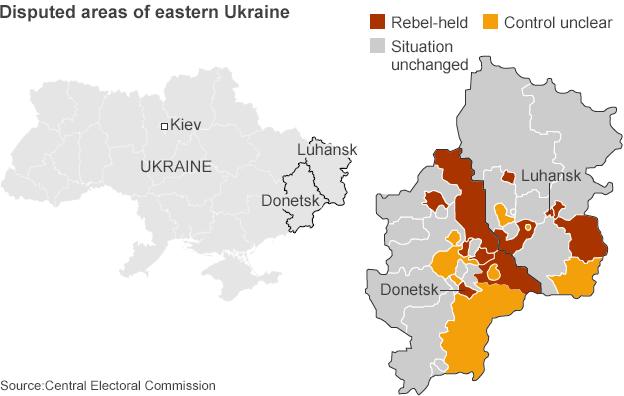

Who are the main contenders?
Billionaire Petro Poroshenko is the clear frontrunner, with former Prime Minister Yulia Tymoshenko trailing behind.
Mr Poroshenko is a confectionary tycoon known as the "chocolate king". He also owns the popular news channel 5 Kanal TV. He has been endorsed by prominent politician Yuriy Lutsenko, a former interior minister, as well as by boxing champion-turned-politician Vitaliy Klitschko.
Mr Poroshenko's election manifesto promises to devolve more authority to the regions in an apparent attempt to calm tensions in the east. At the same time, it vows to preserve Ukraine as a unitary state.
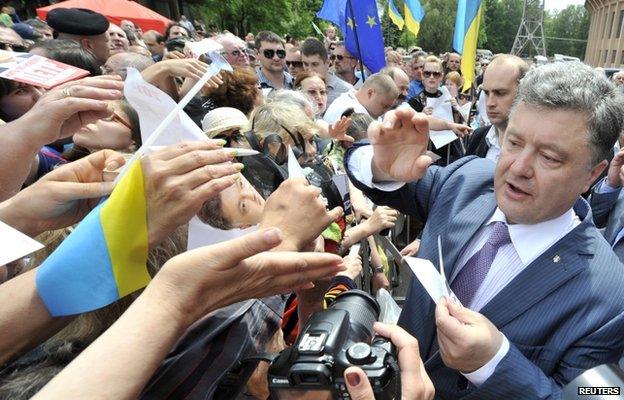
Petro Poroshenko is the clear frontrunner
Former Prime Minister Mrs Tymoshenko, a polarising but charismatic figure, is a fierce critic of former President Viktor Yanukovych. She was jailed during his time in office, in a move widely condemned as politically motivated, but released after he was ousted.
In her campaign, Mrs Tymoshenko has called Russian President Vladimir Putin Ukraine's "enemy number one". She promises to reduce Ukraine's dependence on its "hostile" neighbour, particularly in the energy sector.
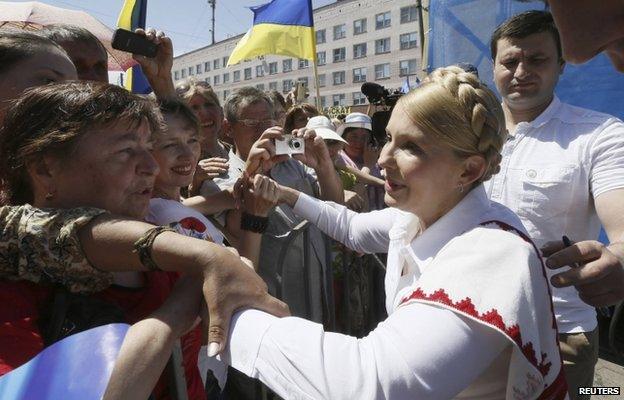
Former Prime Minister Yuliya Tymoshenko is a polarising figure

Who else is running?
Initially 23 candidates were registered, but five have withdrawn from the race. They include pro-Russian MP Oleh Tsaryov and Communist Party leader Petro Symonenko, who complained of harassment by the new government in Kiev.
Those still taking part in the election include Dmytro Yarosh, who is wanted in Russia on terrorism charges. He is the leader of the ultra-nationalist party Right Sector, which was instrumental in President Yanukovych's overthrow.
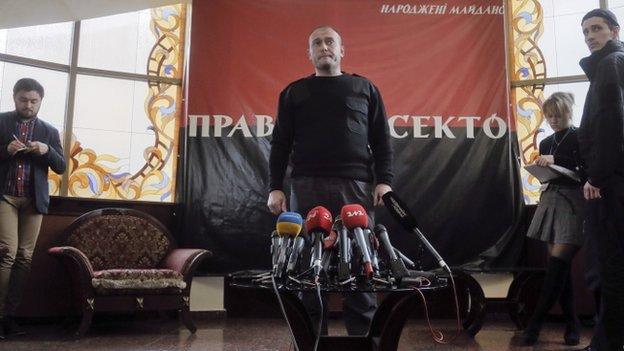
Right Sector leader Dmytro Yarosh is wanted in Russia on terrorism charges
The ruling party under Viktor Yanukovych, the Party of Regions, nominated former Kharkiv mayor and governor Mykhaylo Dobkin as its candidate, but MP Serhiy Tyhypko, who was recently expelled from the party, is also running.

Why does the vote matter?
Officials in Russia and opponents of the government in Kiev say it seized power by toppling the elected president and is therefore illegitimate. There is hope that, once interim President Oleksandr Turchynov is replaced with an elected one, the Ukrainian authorities will gain more legitimacy and trust necessary to put an end to months of upheaval.
However, presidential powers were significantly reduced after Viktor Yanukovych fled Ukraine. The next president will be able to nominate foreign and defence ministers as well as the country's top prosecutor and the head of the security service, for parliamentary approval. The rest of the cabinet will be appointed by MPs.
The president can no longer dismiss the cabinet, but retains the power to dissolve parliament.

What about Russia and the West?
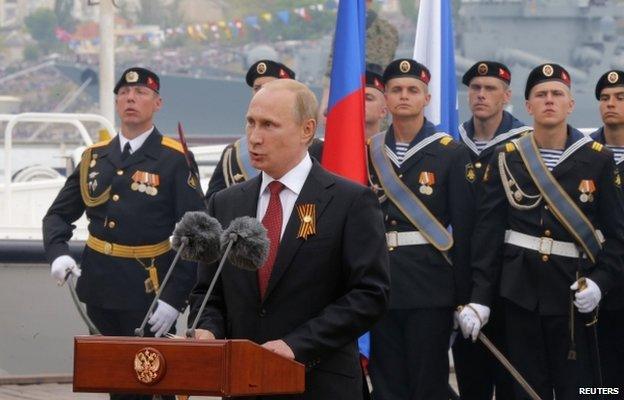
Russian President Vladimir Putin has described the election as "a step in the right direction"
Russia has condemned what it calls Ukraine's "punitive operation" against Russian-speakers, and has questioned the wisdom of holding an election while unrest continues.
Despite that, President Vladimir Putin has said publicly that the election is "a step in the right direction".
But both Kiev and the West have accused Moscow of stoking tensions in Ukraine. The suspicion is that the Kremlin might try to torpedo the election in an effort to weaken Kiev and boost Russia's waning influence over its neighbour.
"If we see the disruptions and the destabilisation continuing so severely that it impedes elections on May 25th, we will not have a choice but to move forward with additional, more severe sanctions [against Russia]," US President Barack Obama said.
BBC Monitoring, external reports and analyses news from TV, radio, web and print media around the world. For more reports from BBC Monitoring, click here. You can follow BBC Monitoring on Twitter , externaland Facebook, external.